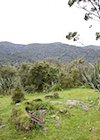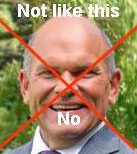Parliament has risen for the summer recess, and New Zealand’s climate policy is reduced to a train wreck of repealed legislation and uncertainty about the emissions trading scheme. PM John Key confirmed under persistent questioning by Greens co-leader Jeanette Fitzsimons yesterday that the ETS would not actually be put on hold. From Hansard:
Jeanette Fitzsimons: With regard to those parts of the emissions trading scheme that came into force on 1 January 2008—relating to forestry—will the Prime Minister or will he not put on hold the penalty regime for deforestation during 2008, and the credits that foresters expect to claim in January 2009 for the carbon sequestered by their forests this year?
Hon JOHN KEY: The current legislation and rules about deforestation stay in place, pending the outcome of the select committee.
Jeanette Fitzsimons: In that case, what precisely is the Prime Minister suspending or putting on hold, given that nothing else is due to come in until 2010 and he is retaining the parts that are already in force; or is the Prime Minister saying that the forestry bit may be taken out of force later, which means they will have to give their credits back?
Hon JOHN KEY: That is exactly the point. Nothing is coming in until 2010 outside of forestry. The high-level select committee will have reported back. It is the hope of the Government that the legislation that will replace the existing emissions trading scheme legislation will be in place long before January 2010.
Fitzsimons take on the exchange at Frogblog is worth a read. Meanwhile, let’s run through a little history. When the ETS was first launched, National supported it. Then they withdrew support for the legislation in the run-up to the election, but campaigned on keeping the basic ETS structure while tinkering with (also known as watering down) the settings. Post-election, to pacify Rodney and his pack of cranks, the ETS was to be put on hold while a select committee considered, amongst other things, whether a carbon tax might be better. Now, on the last day of this session, we learn they’re not going to do that, and the legislation stands until amended.
If this seems like a government that doesn’t know what it’s doing, then I’m not the only one to notice. Brian Fallow in today’s Herald is withering in his criticism. He notes Australia’s new — and disappointing — targets for carbon dioxide reductions:
It ill behoves anyone on this side of the Tasman to be scornful about that, however. At least the Australians have an intermediate target. We have none. At least they have a climate change policy. Ours is in shambolic limbo.
Worse, Key considers that the Rudd government is on the right track, describing Aussie policy as “a very considered and balanced approach to climate change” in Parliament. As Fallow memorably concludes:
Given the countries’ different starting points, Australia’s mid-century target of a 60 per cent reduction in emissions from 2000 levels is similar to National’s 50 per cent from 1990 levels. But while Rudd is taking at least baby steps in that direction, Key is performing some kind of pirouette.
It’s an unedifying spectacle.



 As one would expect from a rurally based sector, foresters are a conservative lot. I don’t say that disrespectfully, because societies – for the sake of stability – need a balanced mixture of change-makers and change-resisters. But it did mean that, when in 1989 I started work on Climate Change and forestry, I met with considerable opposition: “what bullshit is this? The climate has ALWAYS changed. Nature is self-balancing.” And so on, you’ve heard it all before.
As one would expect from a rurally based sector, foresters are a conservative lot. I don’t say that disrespectfully, because societies – for the sake of stability – need a balanced mixture of change-makers and change-resisters. But it did mean that, when in 1989 I started work on Climate Change and forestry, I met with considerable opposition: “what bullshit is this? The climate has ALWAYS changed. Nature is self-balancing.” And so on, you’ve heard it all before.